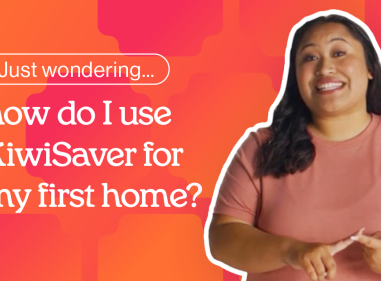
Planning & budgeting
Saving & investing
KiwiSaver
Tackling debt
Protecting wealth
Retirement
Home buying
Life events
Setting goals
Money tracking
Plan your spending with a budget
Getting advice
Studying
Get better with money
What pūtea beliefs do you have?
How to build up your emergency savings to cover unexpected costs
How to save your money
How to start investing
Find a financial adviser to help you invest
Your investment profile
Compound interest
Net worth
Types of investments
Term deposits
Bonds
Investment funds
Shares
Property investment
How KiwiSaver works and why it's worth joining
How to pick the right KiwiSaver fund
Make the most of KiwiSaver and grow your balance
How KiwiSaver can help you get into your first home
Applying for a KiwiSaver hardship withdrawal
How to use buy now pay later
What you really need to know before you use credit
How to get out of debt quickly
Credit reports
Know your rights
Pros and cons of debt consolidation
Credit cards
Car loans
Personal loans
Hire purchase
Student loans
Getting a fine
What happens if I start to struggle with moni?
How to protect yourself from fraud and being scammed
About insurance
Insurance types
Insuring ourselves
Wills
Enduring powers of attorney
Family trusts
Insuring our homes
Losing a partner
Redundancy
Serious diagnosis
How to cope with the aftermath of fraud
Separation
About NZ Super – how much is it?
When you’re thinking of living in a retirement village
How to plan, save and invest for retirement
Manage your money in retirement
Find housing options in retirement
Four approaches to spending in retirement
Planning & budgeting
Saving & investing
How to build up your emergency savings to cover unexpected costs
How to save your money
How to start investing
Find a financial adviser to help you invest
Your investment profile
Compound interest
Net worth
Types of investments
Term deposits
Bonds
Investment funds
Shares
Property investment
View all
KiwiSaver
Tackling debt
How to use buy now pay later
What you really need to know before you use credit
How to get out of debt quickly
Credit reports
Know your rights
Pros and cons of debt consolidation
Credit cards
Car loans
Personal loans
Hire purchase
Student loans
Getting a fine
What happens if I start to struggle with moni?
View all
Protecting wealth
Retirement
Home buying
Reading time: 6 minutes

Choosing the right home loan and repaying it quickly can save thousands of dollars – and free us up to achieve other goals faster!
A house is often the biggest purchase of our lives, and a mortgage (also called a home loan) is typically our biggest financial commitment.
You can get a mortgage directly from a bank or through a mortgage broker. Both have their advantages and disadvantages.
Home loans are also available from ‘non-bank lenders’ such as building societies, finance and insurance companies, trustee companies and credit unions.
‘Non-conforming lenders’ are an option for people who can’t get a bank loan, because of a bad credit history or lack of proof of income. These lenders usually only accept applications through mortgage brokers.
Advantages
Disadvantages
Here are some questions for lenders to have on hand when meeting with a bank.
Brokers deal with a number of lenders, so they can save you time shopping around.
Advantages
Disadvantages
For all loans, ask about application fees and other charges such as a low equity fee.
For fixed-interest loans, ask what fees apply if you increase repayments, make lump sum repayments, or repay the whole loan early.
(Including fees and interest, for the sum I am borrowing and the term I have chosen.)
The lender will have to make an assumption about interest rates to do this calculation. But it will show how much you’ll pay back in total. (Note that the lender is required to disclose the fees and interest separately.)
Also, ask for the total regular payment in a year if the interest rate were to be 1% higher than now. That will give you some idea of the risk if rates rise.
For all loans, ask whether it's possible to increase regular payments from time to time, pay in lump sums, and pay off the mortgage in full before the end of its term.
Ask if there is a required period of notice before reducing or paying off the loan with a one-off payment.
Fixed-interest loans normally convert to a floating rate at the end of the term - ask about taking another fixed term instead at no charge.
If the answer is yes, it's likely to save money in fees.
Approach the lender with a complaint or problem in the first instance. If that doesn't result in a satisfactory resolution there are independent bodies available which can investigate and help settle disputes such as the Banking Ombudsman and the Financial Services Federation, which represents some non-bank lenders.
How much you can borrow depends on what you can afford to repay on your current income, and how much a lender will lend against the value of the property you want to buy. Not sure how to calculate mortgage repayments?
Try our new mortgage repayment calculator and take a look at our guide to borrowing.
There are many types of mortgage, each with its own interest rate, fees and degree of flexibility. All these things affect how much the loan costs and when it will be paid off. Find out more about the different types in this guide.
Once our mortgage is in place, there are steps we can take to make sure it keeps working for us. Read more in our guide to managing a mortgage
Guide
It can feel good being a home sweet homeowner! But – and there is “the but” – we still need…

Guide
The amount we can borrow for a home depends on a couple of things: how much we can afford to…

Guide
There are many types of mortgages, each with its own interest rate, fees and flexibility. Each of these things affect…

Guide
Refinancing (also called remortgaging) is a normal part of home ownership. It’s when you replace your mortgage with another in…

Guide
Getting into a first home takes careful planning and, for most of us, serious budgeting! These tips for first home…

Video
KiwiSaver can help you save up a deposit for your first home. This free video tells what you need to…

Use verification code from your authenticator app. How to use authenticator apps.
Code is invalid. Please try again
Don't have an account? Sign up
Or log in with our social media platforms


A free account gives you your very own space where you can save your tools and track your progress as you get ahead.
Or sign up using Google:


